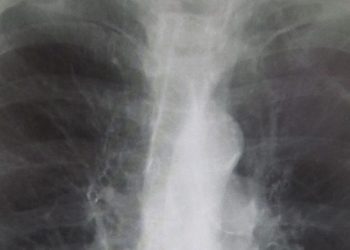The UPLIFT trial: Tiotropium in chronic obstructive pulmonary disease [Classics Series]
Image: PD
1. Tiotropium does not significantly reduce the mean rate of decline in FEV1, a common metric of COPD progression.
2. Tiotropium significantly improves patients’ quality of life, mean FEV1, and decreases the incidence of disease exacerbation.
Original Date of Publication: October 9, 2008
Study Rundown: The progression of COPD can be assessed by measuring the rate of decline in a patient’s forced expiratory volume in 1 second (FEV1). Previous studies have shown that at 1-year, tiotropium, a once-daily, inhaled anticholinergic drug, can slow the decline in FEV1 in contrast to shorter-acting anticholinergic drugs, inhaled corticosteroids, or the mucolytic agent N-acetylcysteine. UPLIFT assessed the longer-term effects of tiotropium by extending its treatment period to 4 years. Study results showed that in patients with COPD who were permitted to use any respiratory medication concomitantly except other anticholinergic drugs, tiotropium was associated with improved lung function, improved quality of life, and decreased incidence of disease exacerbation, but ultimately did not slow the rate of decline in FEV1.
Study limitations include a relatively high drop-out rate in both the placebo group (44.6%) and tiotropium group (36.2%). Additionally, the study’s subjects were predominantly male (75%), which may limit generalizability. Tiotropium’s main disadvantage is that it is more costly than other alternatives. Given that tiotropium does not affect the rate of disease progression, tiotropium may be more cost-effectively used for preventing disease exacerbation in patients with moderate or severe cases of COPD. Finally, since patients could not use other inhaled anticholinergics during the study, the study does not compare the efficacy of tiotropium with that of other anticholinergics.
Please click to read study in NEJM
In-Depth [randomized, controlled trial]: UPLIFT was a 4-year, randomized, double-blinded trial involving 5,993 patients recruited from 490 centers in 37 countries. Of the recruited patients, only 3,535 completed the study. Patients with a diagnosis of COPD, age ≥40 years, a smoking history of >10 pack-years, a postbronchodilator FEV1 ≤70%, and an FEV1 ≤70% of the FVC were eligible for the study. The exclusion criteria included a history of asthma, COPD exacerbation, or pulmonary infection. Patients were randomized to receive either tiotropium or placebo. All other respiratory medications except inhaled anticholinergic drugs were permitted. The primary endpoint was the rate of decline in the mean FEV1 before and after bronchodilation at day 30. Secondary endpoints include changes in quality of life (as measured by St. George’s Respiratory Questionnaire), exacerbations of COPD, and death from any cause. The mean FEV1 values were significantly improved in the tiotropium group at all time points compared to the control, although the mean decline in FEV1 was not significantly different before bronchodilation (P=0.95) or after bronchodilation (P=0.21). Incidence of COPD exacerbation decreased significantly with tiotropium treatment compared to placebo (HR=0.96, P<0.001), while the difference in quality of life also favored tiotropium (P<0.001). However, the incidence of death from any cause was not significantly different between the two groups (HR=0.89, P=0.09).
By Evan Chen and Andrew Cheung, M.D.
© 2013 2minutemedicine.com. All rights reserved. No works may be reproduced without written consent from 2minutemedicine.com. Disclaimer: We present factual information directly from peer reviewed medical journals. No post should be construed as medical advice and is not intended as such by the authors or by 2minutemedicine.com. PLEASE SEE A HEALTHCARE PROVIDER IN YOUR AREA IF YOU SEEK MEDICAL ADVICE OF ANY SORT. Content is produced in accordance with fair use copyrights solely and strictly for the purpose of teaching, news and criticism. No benefit, monetary or otherwise, is realized by any participants or the owner of this domain.


![2 Minute Medicine: Pharma Roundup: Price Hikes, Breakthrough Approvals, Legal Showdowns, Biotech Expansion, and Europe’s Pricing Debate [May 12nd, 2025]](https://www.2minutemedicine.com/wp-content/uploads/2025/05/ChatGPT-Image-May-12-2025-at-10_22_23-AM-350x250.png)






